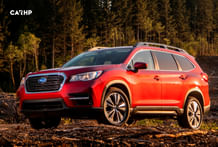|
S. No
|
Date
|
NHTSA ID
|
Issues Noticed
|
Additional Remarks
|
|
1
|
December 23, 2021
|
21E103000
|
The power steering gear assembly may leak oil.
|
A sudden oil leak can cause a loss of power steering assist, increasing the risk of a crash.
|
|
2
|
November 4, 2020
|
20V682000
|
The fuel pump may fail.
|
A fuel pump failure causes engine stalling, increasing the risk of a crash.
|
|
3
|
January 13, 2020
|
20V012000
|
The fuel pump may fail.
|
If the fuel pump fails, the engine can stall while driving, increasing the risk of a crash.
|
|
4
|
March 27, 2019
|
19V244000
|
Non-permanent text on load capacity label.
|
If the driver cannot read the label, they may unknowingly overload the vehicle, increasing the risk of a crash.
|
|
5
|
October 4, 2018
|
18V685000
|
The airbags may not deploy as intended.
|
If the airbags do not deploy as intended, it can increase the risk of an injury in a crash.
|
|
6
|
February 20, 2018
|
18V122000
|
Electronic stability control deactivates./FMVSS 126.
|
Deactivation of the vehicle stability control system can increase the risk of a crash under certain conditions.
|
|
7
|
May 11, 2017.
|
17V311000
|
Defective lugnuts may crack or detach.
|
Lugnuts that can crash or detach may cause the wheels to separate from the vehicle, increasing the risk of a crash.
|
|
8
|
June 2, 2016
|
16V396000
|
Seat heater electrical wiring may melt.
|
A damaged copper strand heating element may short circuit increasing the risk of a fire.
|
|
9
|
October 22, 2015
|
15V689000
|
The power window master switch may melt.
|
Due to debris and moisture, the switch may cause a short circuit which increases the risk of a fire.
|
|
10
|
November 19, 2014
|
14V743000
|
Seat heater electrical wiring.
|
Damage to seat heater electrical wiring can cause wires to short increasing the risk of fire and injury.
|
|
11
|
April 9, 2013
|
13V123000
|
Inaccurate load carrying capacity labels.
|
An inaccurate label can lead the owners to overload their vehicles and tires. An overloaded vehicle can result in tire failure increasing the risk of a crash, injury, or property damage.
|
|
12
|
January 16, 2013
|
13V014000
|
Occupant sensing calibration.
|
If the front passenger seat occupant sensing system is out of calibration, the front airbags may not deploy or deploy inappropriately for the passenger’s presence. This increases the risk of personal injury in an event of a crash necessitating airbag deployment.
|
|
13
|
March 4, 2011
|
11V148000
|
Tire pressure monitoring system./ FMVSS 138
|
A failure to detect tire deflation is a non-compliance with FMV 138 and can lead to tire failure increasing the risk of a crash
|
|
14
|
February 3, 2010
|
10V036000
|
Load carrying capacity modification labels.
|
An operator may overload the vehicle increasing the risk of a crash.
|
|
15
|
February 3, 2010
|
10V035000
|
Load carrying capacity modification labels.
|
Load carrying capacity labels do not meet the standard requirements.
|
|
16
|
January 21, 2010
|
10V017000
|
Sticking accelerator pedal.
|
The accelerator pedal may become hard to depress, slow to return to idle, or mechanically stuck in a partially depressed position. Increasing the risk of a crash.
|











